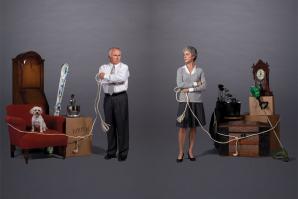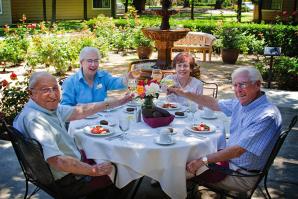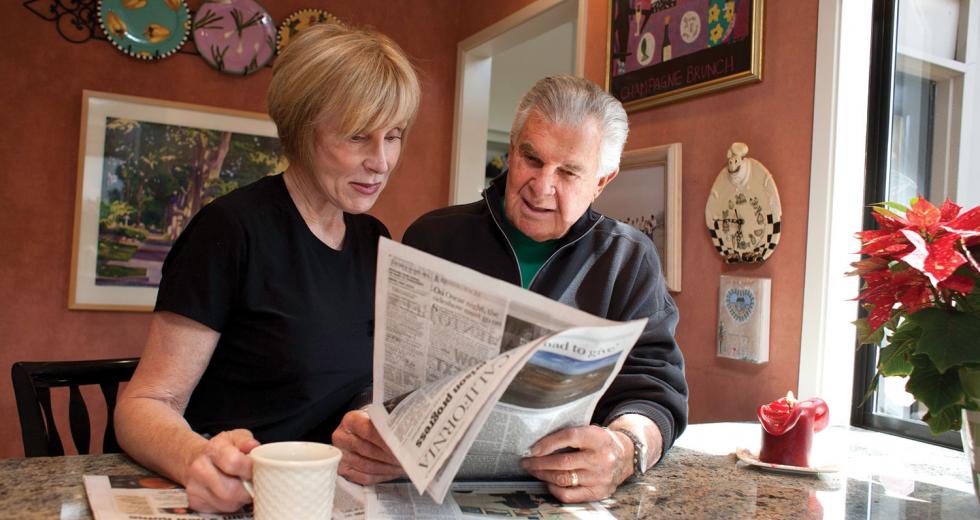Stan Atkinson could be described as a homebody these days. It’s not that he doesn’t like to go out occasionally, but Atkinson, like many other aging Americans, would prefer to stay in his home as long as possible.
That’s why the 80-year-old retired news anchor opted for a reverse mortgage on his Sacramento home three years ago.
They’re not for everyone, but reverse mortgages are increasingly being viewed as one of many financial tools for seniors planning for in-home or long-term care and housing costs. As more people live longer and an explosion of baby boomers reach their golden years, older Americans are facing questions about where they want to spend the end of their lives and how to pay for it.
In Atkinson’s case, the strategy is allowing him to save $900 a month in mortgage payments, which can be used to pay for future care, if needed. It also guarantees that his wife, who is 15 years his junior, will be able to stay in the home.
“We love our home, it’s single-story and very well suited to our needs later in life,” Atkinson says. He also likes the fact that if there is a deficit balance in the home’s equity when the title changes hands, his heirs will not be responsible for making up the difference. The Federal Housing Authority (FHA) is on the hook.
An estimated 10,000 people a day are turning 65 nationwide, says Terry Bollons, president of Senior Helpers in Sacramento, an in-home and long-term care referral agency.
In the next 30 years, more than 500,000 people over the age of 60 will live in Sacramento County, three times more than in 2000. And by 2020, an estimated 10 million Americans will be living with Alzheimer’s disease, requiring a high level of care.
In addition, since 2000, health care costs have risen by 150 percent, Bollons says, and is predicted to continue growing at a dramatic rate. Meanwhile, the state recently cut more than $1 billion from senior services, including adult day care and in-home support services.
Bollons points out that 98 percent of assisted living facilities in the Sacramento area are at full occupancy, and up to 90 percent of seniors nationwide want to stay in their homes into their 80s and even 90s, according to the American Association of Retired People.
These trends are colliding to impact two generations, as baby boomers plan for their own care while simultaneously ensuring that their aging parents receive the support they need as well. Many of these people are fighting the prospect of having their life savings wiped out and their estates drained.
Bollons says the trend of getting older and losing more function means they need to get more innovative with financing tools, such as creating family trusts and collecting veterans’ benefits, to supplement fixed monthly incomes.
Many senior homeowners choose to use a reverse mortgage, which converts home equity into tax-free funds to help them meet financial and personal goals, says Pete Engelken, president of Genworth Financial Home Equity Access Inc. in Sacramento.
“Borrowers can use proceeds from a reverse mortgage loan any way they choose,” Engelken says, including paying off mortgage debt, supplementing retirement income or funding medical needs or in-home care. “It’s really up to the borrower how they want to spend their money,” he says.
The most common reverse mortgage is a home equity conversion mortgage (HECM) loan, insured by the FHA. Unlike traditional mortgages and home equity loans, a reverse mortgage doesn’t require monthly payments and only has to be repaid when the youngest borrower on title permanently leaves the home or passes away.
“It’s important to note that borrowers are still responsible for paying home insurance, taxes and related property charges for the term of the loan,” Engelken says.
He says a reverse mortgage could be an ideal option for some seniors on a fixed income who need to supplement their retirement savings and plan to stay in their home for many years to come.
“It also works best when they don’t have a very large mortgage to pay off on their property,” Engelken notes. “A reverse mortgage is generally not recommended if there are titleholders on the property who are younger than 62 years old or if the borrower doesn’t have enough income to pay for ongoing property charges, such as homeowners insurance, taxes and maintenance over the term of the loan.”
Typically, single-family homes, townhouses and FHA-approved condos are eligible.
Genworth only provides government-insured home equity conversion mortgages designed with safeguards to protect senior borrowers. Borrowers are required to obtain independent counseling to ensure they understand the product and options, and FHA requires a mandatory insurance premium so borrowers or their heirs don’t own more than the appraised value of the home when the loan matures.
Still, Bollons only advises a reverse mortgage as a last resort.
“In many cases, equity in homes has dissolved because of lower home values, so they may not be able to get very much, or they may not qualify,” he says. Many seniors are highly resistant to giving up their home to pay for housing and care.
“For many seniors, if they had to choose a reverse mortgage or swallowing their tongues, they will choose swallowing their tongues,” Bollons says.
Amy and Fred Maltby, both 86, have opted to create a family trust so they can collect veterans’ benefits to supplement their social security and monthly pension checks.
“I don’t believe in reverse mortgages. I think they’re nothing but a gimmick,” says Amy Maltby. “When I go, I want this home to go to my daughter. Why would I want to give up my home?”
She and her husband, both retired from jobs at grocery stores, have a small mortgage payment. They’ve put all their assets, including their home, into a family trust controlled by their daughter. That way, they qualify for monthly benefits from the U.S. Department of Veterans Affairs, the result of Fred’s World War II service.
Bollons says donating a home and savings to a trust managed by a family member can protect a senior’s estate from being drained. Veterans can receive $1,675 a month in benefits for care, while spouses can receive up to $1,100 a month.
“Of the 3.5 million that qualify for these benefits, less than 150,000 are receiving them,” Bollons says.
Tom Pinocci, branch manager of Security1 Lending in Elk Grove, says the ideal candidate for a reverse mortgage is someone who plans to stay in his or her home for the long term, so the costs of the loan are amortized. The client needs to meet the minimum age requirement of 62, and may use the money for various reasons.
“A reverse mortgage is for people who need to tap into equity to pay off debt, help a family member, free up cash flow on a fixed income or to pay for long-term care,” Pinocci says.
The downside, however, is that interest is accruing on the loan balance, and with home values going down, some of the loans might be upside down.
Heirs may be surprised at the amount of equity that has been used in the process.
“Some heirs might get fired up, especially if they didn’t know about the reverse mortgage,” Pinocci says. “But Mom and Dad were able to improve their quality of life, so it works out.”
Recommended For You

Golden Years Go Broke
When divorce sucks the life out of retirement
Visions of the golden years often include thoughts of second homes, lush fairways and RV cruises through Yellowstone, but for more and more aging baby boomers, one traumatic event — divorce — can upend plans for retirement.

Better With Age
Emerging trends offer senior living with style
Retirement communities are facing the challenges that come with catering to seniors in the 21st century. These consumers — and there are a lot of them — are demanding greater access to technology, life-long learning programs and attention to overall wellness.



